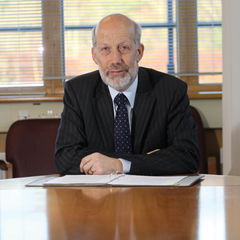David Ford interview: reshaping justice
 David Ford discusses his time in office to date with Owen McQuade, emphasising how justice can be speeded up and contribute to a shared future.
David Ford discusses his time in office to date with Owen McQuade, emphasising how justice can be speeded up and contribute to a shared future.
Times have certainly changed since agendaNi last interviewed Ford, as the Assembly’s ‘leader of the opposition’. At that time, Paul Goggins was settling into the NIO justice brief at Castle Buildings. Ford is now well established after eight months as the first local Justice Minister since March 1972.
“Challenging, interesting, fascinating” are three words which David Ford picks out to sum up his time as Justice Minister to date.
“It’s certainly been interesting to see the range of responsibilities the department has,” he reflects. “And there’s no doubt that whatever briefings you may have in advance of taking up the post, the first day you sit behind that desk over there is an entirely different day from the day before.”
Describing his burden of responsibility, he realises that that “the buck very definitely rests on that desk” when he is the only person in Northern Ireland who can legally carry out some duties.
Like other parties, Alliance was briefed by NIO ministers about the proposed Department of Justice so Ford considered himself “reasonably well-informed” before taking office. However, the South Antrim MLA adds that “you really don’t see the amount of work, the full complexity of it, until you’re suddenly faced with submissions hitting the desk and hitting the night-time box”.
Reform
Reshaping the justice system has been the key theme for Ford.
“Paramount has to be a financial driver to ensure better efficiency but there also seems to be key issues where the justice system doesn’t meet the needs of the people of Northern Ireland as well as it might,” he explains.
To him, the policing and community safety partnerships proposed in the Justice Bill are: “a logical way of recognising that we’ve got some complex structures which don’t work terribly well and we need to improve them.”
Ford also expects to see progress through the reviews of the Prison Service and access to justice (which includes legal aid) and, crucially the ongoing work to speed up criminal justice.
“The time that the public are interested in is the time between an offence being committed and the person responsible being disposed of in court,” he states. “They’re not interested in whether it was the police [which] took the delay or the PPS or the Court Service. And we need to ensure that the system joins up better to get much speedier delivery on a par with what happens in other jurisdictions.”
Ford admits that each of those issues is “individually relatively modest” but collectively he thinks that progress on them will make a “huge difference” to the way the system operates.
The prison review, chaired by Dame Anne Owers, is due to report early this year. While not wishing to pre-judge its outcome, the Minister sees a “huge need” to promote reform which would provide a better service and “not just to cut costs”.
Rehabilitating offenders is central, in Ford’s view.
“What I think we have to see is a Prison Service which does more to promote rehabilitation and stop re-offending because ultimately we make the community safer not by locking people up [but] by stopping them re-offending at the point when they come out,” he explains.
“And whilst we have a tolerable record in that respect, it’s not anything like as good it should be given that we’re spending roughly twice as much per prison as is being spent in other neighbouring jurisdictions.”
Part of Northern Ireland’s good news is that the province sends relatively few people to prison. That said, the province spends “far too much” and is “not getting particularly good results” for those going to prison.
In the week of the interview, there were 1,428 prisoners for a population of 1.79 million. The re-offending rate is 42.8 per cent and the Criminal Justice Inspectorate puts the actual cost per prisoner place for 2009-2010 at £94,805.
Ford sees good work being done in all three institutions but these are “small initiatives being done by small groups of staff who are using their own time, their own talents”. Officers at Maghaberry helped prisoners to put together electronic Christmas cards for their families, if they were faraway, which the officers then sent off by email.
It is put to him that simply ‘locking people up’ was probably the more populist option, and in reply he points to the same attitudes in the media.
“I did an interview for a certain BBC Radio programme that shall remain anonymous at 9.03 one morning,” he says, “and I actually pointed out that in Italy, prisoners are expected to work a significant working week and are paid a significant amount for their prison work, which goes to keep their family in the community and gives them a sum for when they go out to help them become rehabilitated.
“And Mr Nolan’s eyes lit up and [he] started to attack me on that point, which was immediately followed by two callers phoning in, saying: ‘Of course we have to work to make sure that prisoners have something constructive and useful to do so they’re rehabilitated when they come out.’
 The callers were not ‘plants’ and he thinks there is a “much greater understanding in the community of those points than sometimes comes across.” Ford adds: “I think we’re too easily swayed by the Daily Mail.”
The callers were not ‘plants’ and he thinks there is a “much greater understanding in the community of those points than sometimes comes across.” Ford adds: “I think we’re too easily swayed by the Daily Mail.”
Ford’s emphasis on rehabilitation is partly influenced by his previous career as a social worker with the old Northern Health and Social Services Board.
“It certainly means I don’t see things like [the] treatment of prisoners in perhaps the same black-and-white terms as some others would,” he comments.
“We have to recognise that there are factors behind offending at the same time as we have to recognise that offenders have to be punished in an appropriate way and rehabilitated at the same time … And if the alternative is lock people up or rehabilitate them, rehabilitation has to happen.”
He sees community sentencing, community service, fixed penalty tickets and a “more creative” use of probation supervision as very positive examples of work, which can protect the community by rehabilitating offenders.
Shared future
As Alliance’s leader, he has prioritised a shared future within his brief. Asked how criminal justice can achieve this, he points to the department’s community safety work, which is one of its largest responsibilities.
“We’re doing a lot of work at the moment, particularly in conjunction with DSD and the police on disaffected youth, people in hard-to-reach areas, seeking to reach the areas which still continue to suffer most the after-effects of the Troubles and where there are ongoing issues,” he comments. “And I think that is a key part of the shared future policy which we need to get.”
The concept of a shared future applies across every part of society but problems are particularly acute at interfaces.
Ford recalls how last summer, he received a request to extend a peace wall which he turned down. This differs from the NIO’s response of “sticking up physical barriers” rather than trying to overcome divisions.
“I took the view [that] what we should be doing is putting money into good relations and assisting that element of community safety, rather than merely sticking another 100 metres on a wall which meant that if people wanted to cause trouble, they’d just go a further 100 metres round it.”
This approach, he contends, supports the work being done by communities in some areas. In another case, the department is “trying to get a bit more creative thinking” from other government agencies, to remove barriers where local people want that to happen.
“They’re not solutions,” he says of peace walls. “They’re merely short-term remedies.”
As expected, Ford has met his main counterparts: Home Secretary Theresa May, Justice Secretary Ken Clarke, Kenny MacAskill in Scotland and Dermot Ahern in the Republic. However, he is reluctant to contrast Northern Ireland with its neighbours and prefers instead to focus on the province’s achievements.
“I don’t actually think Northern Ireland is that much worse,” he remarks.
Crispin Blunt, the Prisons Minister for England and Wales, has visited Northern Ireland to talk about the Youth Justice Agency’s work “because England and Wales thought they could learn from Northern Ireland, which is a pleasant thing to say.” In Ford’s view, our youth conferencing service is “probably leading in these islands if not wider”
Looking ahead
Under the Hillsborough Agreement arrangements, the Justice Minister remains in post until the Assembly removes him or, as is more likely, the election in May. If Ford wishes to continue, he would have to be re-elected by a cross-community vote following the Assembly election.
“I haven’t been particularly concerning myself with that,” he continues. “I’ve been concerned with trying to make the most of the year that I’ve got and obviously I hope that if people think that I’ve been doing a good enough job, that they will re-elect me.
“In my position, I’d be very foolish to depend upon anything other than ‘I do my best’ and if people like what I’m doing, they’ll put me back into the post.”
By May 2012, the Assembly must decide whether to keep the current model or introduce a different one.
Any new minister is “always full of enthusiasm for making changes” but he has been frustrated by “bureaucratic inertia”, long consultation periods or the need for extra legislation.
“That’s why I think if we can get what at this stage is the largest single Bill potentially to go through the Assembly in a four-year term through in one year, it will be quite an achievement,” he predicts.
On a personal level, going into government has increased an already large workload but he thanks his staff for their help.
“You think you’re busy as an MLA and as a party leader, and then you suddenly discover that you’ve managed to create another several hours every day,” he states.
“I’m extremely fortunate I have a good staff team that supports me across the department generally and in my private office in particular. And frankly, I couldn’t do my job as effectively as I’m doing it without that level of back-up from people who know the topics they’re dealing with to get on with it.”
A very good constituency team also gets on with their work with “only minimal interference by the boss.”
Rather than seven county court divisions, sub-divided into 21 magistrates’ court districts, Ford wants to see a single jurisdiction for Northern Ireland so cases can be heard at the most appropriate courthouse. Court lists could also be organised more efficiently.
“It may be, for example, that a crime has happened in Enniskillen but the victims are in Ballymena and life would be easier for them,” the Minister explains. “If the alleged perpetrator is in custody in Maghaberry, they could go to Ballymena court as easily as to Enniskillen court.”
While the proposal sounds “relatively simple”, it did not get into the current Justice Bill due to time constraints. Ford hopes to see it in a second Bill.







